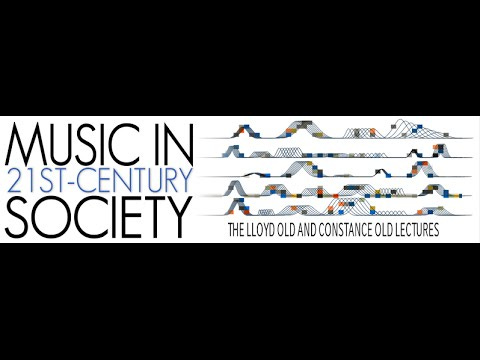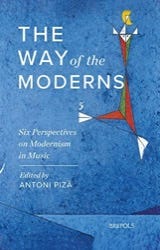A Talk with Roger Scruton
"Walking Among Noise: Tonality, Atonality, and Where Do We Go from Here"
On October 16, 2015, at the Graduate Center in New York, as part of the Music in Twenty-First Century Society series, under the sponsorship of the Lloyd and Constance Old Lecture, I took part in a conversation with the conservative philosopher and musicologist Roger Scruton. The series, which ran from 2012 to 2016, has just been collected as The Way of the Moderns, published by Brepols.
That night, Roger Scruton, who died in 2020 at 75, gave the talk “Walking Among Noise: Tonality, Atonality, and Where Do We Go from Here,” the Perspectives Ensemble played a series of string quartets in his honor, and then we sat down together. The whole evening can be seen here:
Greil Marcus: My name is Greil Marcus, and it's a privilege to be here. I want to say that we very deeply regret that the sponsor of this event, Constance Old, is not able to be here tonight but I believe she is watching on our live-stream; I hope so. If so, Constance, we wish you a speedy recovery.
So, I want to start with a few quotations, and one is an old favorite of mine. It's from an anthropologist named James C. Faris, and he was commenting on the issue of Current Anthropology some thirty years ago, on an article by the artist Whitney Davis called "The Origins of Image Making." Whitney Davis, in an article of the same journal, was trying to account for the beginnings of art, and this was Faris' comment: "can we predict from Davis' generative approach the images that came to characterize the Upper Paleolithic? Why these images rather than others, say, plants or small animals, and why not suns or snakes or faces as the realization (semantization) of the C curve? Nor will this approach to capacities account, in any nontrivial sense, for fascism, belief in afterlife, the periodic table, rock and roll, or the incest prohibition."1 Now I like the idea that rock and roll is a fundamental element of what it means to be human, or at least it seems to be the argument that James C. Faris is making with a great deal of delight, I think.
Now, among Roger Scruton's many books is a wonderful book called The Soul of the World, which is about the disappearance of the sacred dimension of life in the modern world and how it might be retrieved and restored. And one of the areas of life that he focuses on is music. And he has a number of things to say about music that to me applied to all music. He states that, "Music is a perceived resolution, a conflict between freedom and necessity made available in a space of its own. It is a reality that cannot be grasped from the ordinary cognitive standpoint.2 And it's there where the element of the sacred, the element of the religious dimension Roger Scruton has talked about earlier, can be present, I think, in any music. Certainly in rock and roll, in pop music, in blues, in jazz, there are moments when the listener—whether the listener is listening in silence or not—is overcome with a sense of unlikeliness, the listener's absolute inability to account for what is happening, what he or she is hearing. And the listener becomes overwhelmed with a sense of awe, a sense of impossibility, a sense that something is taking place beyond mere intention. The composer's or artist's or performer's—musician's or singer's—intention cannot at all account for a sense of the presence of the intervention of some exterior force beyond the ordinary cognitive standpoint, the intervention of some external intelligence or even gnosis.
Bob Dylan, working on his song "Like a Rolling Stone," says, "You know, when I start a song, I'm not thinking about what I want to say, I'm thinking, is this ok for the meter."And then he says, “But with a song like that, it's like a ghost is writing a song, it gives you the song and goes away, you don't know where it came from." So, I think that this sense of the unlikely, the sense of something that music contains beyond the ordinary cognitive standpoint, is fundamental to all music. And so, I wonder, Roger, what you think about it.
Roger Scruton: This is a very challenging suggestion because I would like to make a distinction between music that really does try to aim beyond the ordinary rhythms of an everyday life, and music that stays locked within those rhythms. But I agree with you that, of course, you can't say that the classical tradition has a monopoly of meaning in music. There is plenty of meaning outside the classical tradition, but I also think—and this is something that I didn't talk about and is actually fundamental for the future of any art form—that the life of an art form depends on making judgments. Just to say, "Let it all happen," or, "Anything goes," is to renounce the main artistic obligation, which is to find the things that improve, which amplify the human condition, which give something to it that is more than it has without that art. If you are to talk about pop music, which I didn't really want to do, you would still have to distinguish between the pop music that tries to lift the listener out of the ordinary, so as to give a sense of the meaning that lies beyond the ordinary, and pop music that is just a part of the ordinary. I think we can see this if we consider how much of pop music is made by machines: EDM, house, all that stuff. You press a button and it comes on. The stuff that drove me mad at the railway station this morning contained the noise of a rhythm machine. That place where human beings should be quiet and at peace had been confiscated by a mere mechanism. This mechanization occurs in a lot of pop music, and it has an addictive side to it. It brings you down to the level of instinctive gratification—just press the button and the rhythm will go on and go on all day. I want to say that there is, in the better sort of music, whether pop or classical, a standing back, an act of contemplation, the entering of that unreal space, which is unreal from the physical point of view, but more than real from the spiritual point of view.
Greil Marcus: I have very strong Luddite tendencies myself, but I'm wary of drawing a fundamental distinction between humans and machines. I think Truman Capote said of Jack Kerouac, "That's not writing, that's just typewriting," which, you know, for the time that he said it—Mark Twain wrote Life on the Mississippi on a typewriter—seemed a little precious. And we've all had the experience—some of you are not old enough to have had the experience—of having to make the transition from a typewriter to a computer, and the sort of rush of pleasure and delight that that can create. Nevertheless, I think that you talk about standing back and having as a goal, having something before you, to reach this sense of music as something, as you said, in a space of its own. That could also happen in the act of music making without somebody saying, "Well, I have a transcendent goal in front of me." I actually don't understand your position that the classical tradition has a monopoly on meaning. There are all kinds of traditions, and nothing exists in a vacuum. You spoke of the oppression today waiting for a train and certainly canned music can be extraordinarily oppressive. I had the experience today at the 34th St. Herald Square subway station just up the street from here. I was coming up the stairs, and I heard somebody playing an electric guitar. It was atonal with extraordinary confidence and notes were just shattering in every direction. It was very loud. It was tremendously abrasive and it was absolutely full of life. And I walked down to find who was making this noise, and it was a middle age man wearing a crown with a sign with his name: Remy François. He was playing "House of the Rising Sun," and he was cutting it into pieces, he was breaking it apart, he was shattering it, and yet there was something about the melody of the song that held its shape, that could not be taken apart. And he persisted with this, playing up the string, playing a song that goes back into the nineteenth century, was first recorded in the 1920s, then had a version by Bob Dylan in 1962, was made into a worldwide hit in 1964 by The Animals, and entered the consciousness of people globally, where it remains. He was affirming that tradition by, in a way, saying that it could not be broken. There are infinite ways of seeing and feeling and experiencing meaning from that little concert that Remi François was performing today. So, I don't understand how any one tradition could have a monopoly on making meaning.
Roger Scruton: I certainly didn't want to say that any one tradition does have such a monopoly. Let me be strictly honest: I think that the classical tradition, as I understand it, is the greatest achievement of Western civilization and it contains within it a reflection on the human condition that has no match elsewhere. That is a heretical view from a lot of standpoints, but that is what I think. It doesn't follow that there aren't other human enterprises that have captured something equally well. And there are aspects of the meaning of life that have not yet been embodied in Western classical music; that is entirely true. But still I feel that, if one has the experience of a great spiritual achievement handed down the centuries, one should hold onto it and try to understand it. I don't want to close the door to competitors. I'm not casting adverse judgment on all the other possibilities. I want to say something positive, so to do that I have to talk about the thing that I really know and understand. I don't really know and understand pop music. I always felt that it would be a waste of my time, though I could perhaps give the remaining three or four years of my life to this enterprise, if you think I should.
James C. Faris in response to Whitney Davis, “The Origins of Making Music,” Current Anthropology, Vol. 27, No. 3 (June 1986), p. 204.
Roger Scruton, The Soul of the World (Princeton: Princeton University Press, 2014), p. 146.





So, basically, in this debate, in the end, Greil gets Scruton to devote the few remaining years of his life to understanding pop music. Love that.